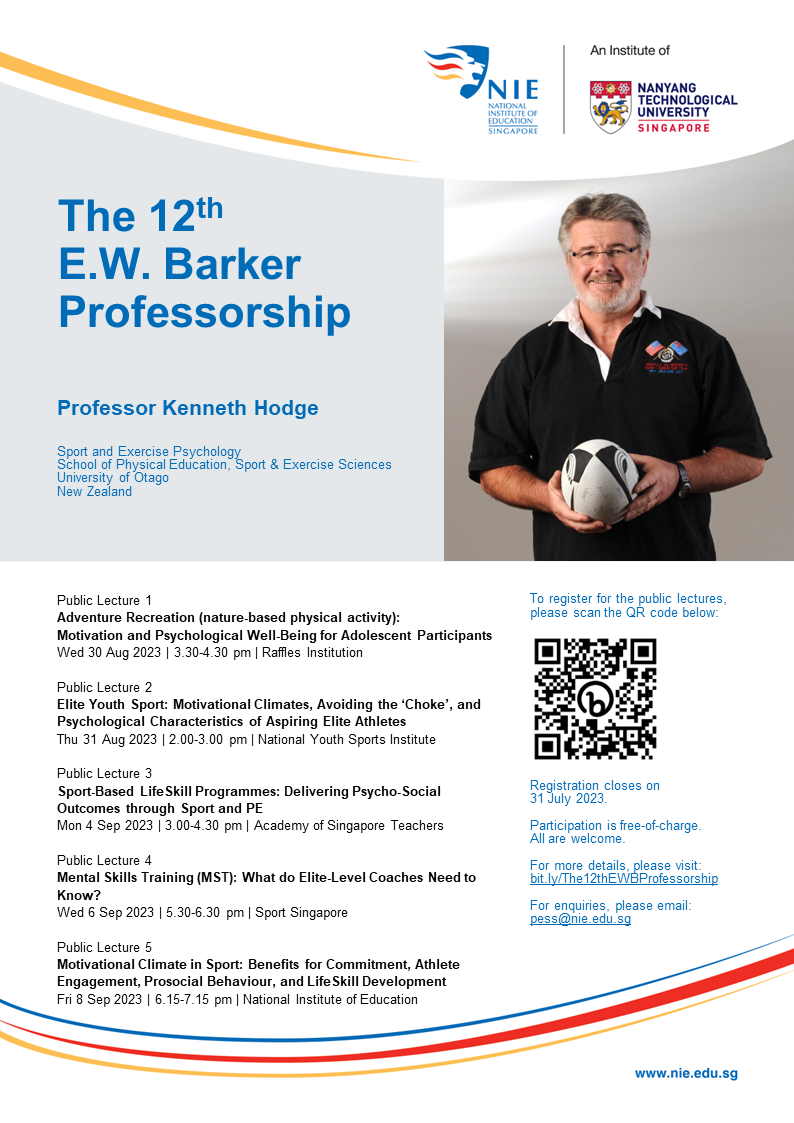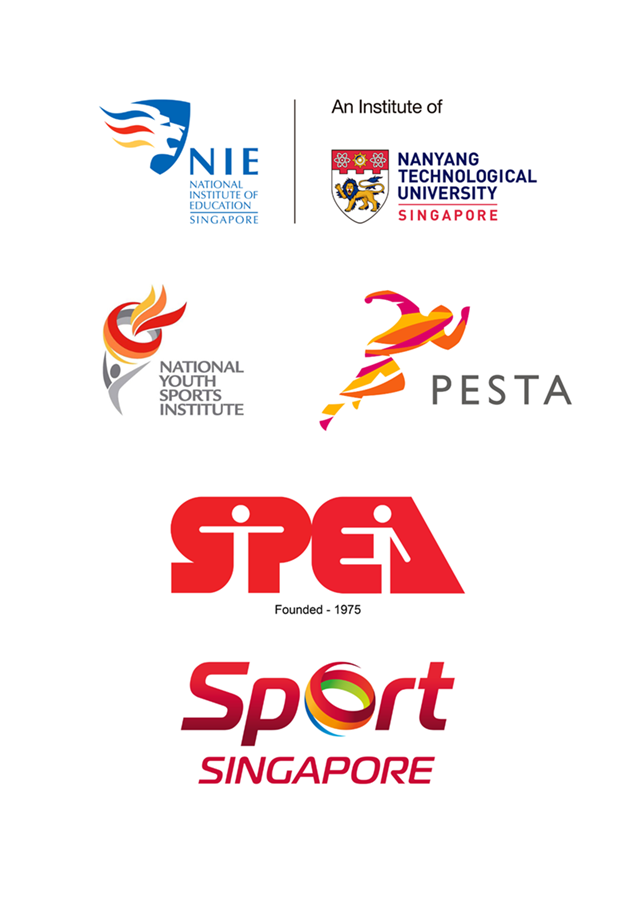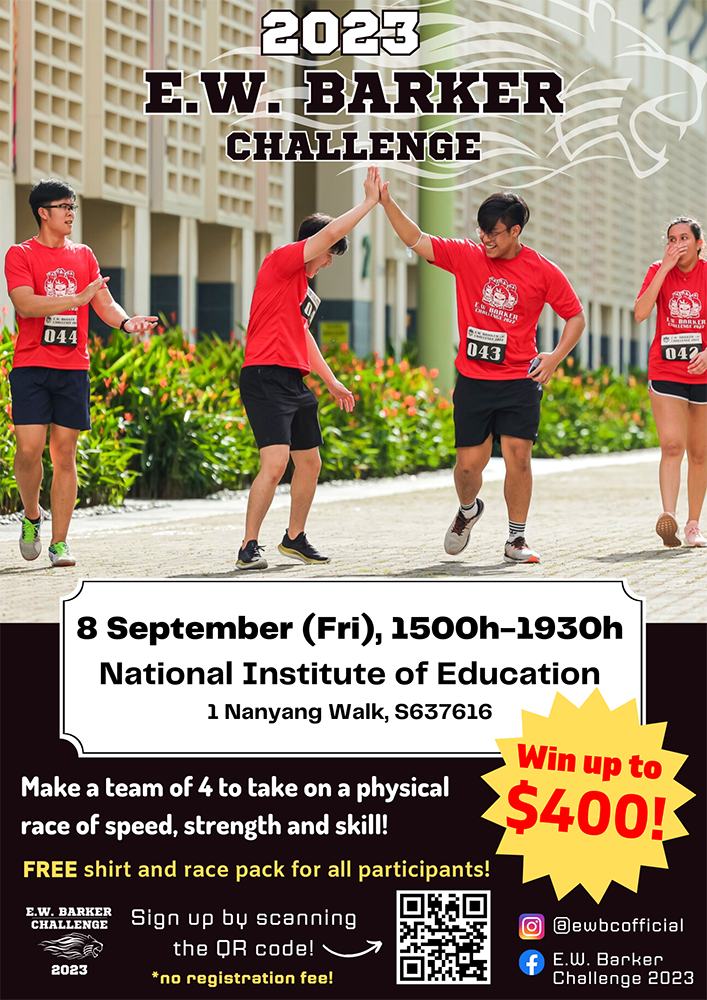The 12th E.W. Barker Professorship (28 Aug - 8 Sep 2023)
Welcome Message
On behalf of the organising committee of the 12th E.W. Barker Professorship, thank you for sharing the same passion and belief with me; the passion and dedication that physical education and sports connects people and makes the world a better place for all of us. Thank you for your registration, and we are glad that you will be with us for this event.
PESS will be hosting the 12th E.W. Barker Visiting Professor, Professor Kenneth Hodge, from 28 August to 8 September, 2023. Professor Hodge is a professor in sport and exercise psychology at the School of Physical Education, Sport and Exercise Sciences, University of Otago, New Zealand (NZ). His research focuses primarily on the psycho-social effects of participation in sport. In particular, he has investigated issues such as life skill development through sport, sport and psychological well-being, self-determined motivation in sport, sport commitment, prosocial and antisocial behaviour in sport, athlete burnout, and athlete engagement.
During his professorship, Professor Hodge will be delivering 5 public lectures. I hope you will benefit from the public lectures. I strongly encourage you to translate the knowledge obtained from this event into practice to benefit your students and athletes.
As the main event organiser of the 12th E.W. Barker Professorship, I acknowledge that the event's success will not have been possible without the organising committee members. They have worked relentlessly in planning and putting together the programme. I would also like to thank the sub-committee organisers for their advice and suggestions.
Lastly, I hope that the event will support staff and student exchanges, research collaborations, educational links among higher learning institutions, and, most importantly, consolidate and enrich friendships among participants, near and far.
I look forward to welcoming you to The 12th E.W. Barker Professorship Public Lectures and the E.W. Barker Challenge 2023.

Associate Professor Koh Koon Teck
Head, Physical Education and Sports Science Academic Group
National Institute of Education
Nanyang Technological University
Singapore
About the E.W. Barker Professorship
In remembrance of Mr. Edmund William (E.W.) Barker and his contributions as statesman, scholar, sportsman and a supporter of sports, the E.W. Barker Professorship and Scholarship Fund was launched in his honour on 27 August 2002.
The E.W. Barker Professorship aims to identify world-class researchers and other renowned individuals, and invite them to look into the emerging needs and practices of physical education and sports in Singapore. In keeping up with Mr. Barker’s ability to transcend all levels of sporting prowess, individuals invited on the professorship are expected to share their expertise with athletes, teachers, coaches and academicians in the areas of physical education and sports.
The 12th E.W. Barker Visiting Professor
.jpg?sfvrsn=8053a1a4_1)
Professor Hodge is a Professor in sport and exercise psychology at the School of Physical Education, Sport & Exercise Sciences, University of Otago, New Zealand (NZ). His research focuses primarily on the psycho-social effects of participation in sport. In particular, he has investigated issues such as life skill development through sport, sport and psychological well-being, self-determined motivation in sport, sport commitment, prosocial and antisocial behaviour in sport, athlete burnout, and athlete engagement. He is a former Associate Editor for the Journal of Applied Sport Psychology; and currently serves on the Editorial Boards for The Sport Psychologist, Journal of Applied Sport Psychology, Sport, Exercise & Performance Psychology, and the Asian Journal of Sport and Exercise Psychology.
In addition, he has worked for a number of sports as a Mental Skills Trainer. For example, he has worked for the NZ Academy of Sport, the NZ Rugby Union (e.g., 2010 Highlanders Super Rugby Team), and Netball NZ (e.g., 2006-2007 Silver Ferns); as well as NZ Swimming and NZ Golf providing Mental Skills Training for a number of different teams and individuals. In 2006 he worked as Team Psychologist for the NZ Winter Olympic Team at the Torino Games. Similarly, in 1992 he worked as Team Psychologist for the NZ Summer Olympic Team at the Barcelona Games and in 1990 and 1994 he worked as Team Psychologist for the NZ Commonwealth Games Team. In 2014 Ken worked with the IRB Sevens Rugby Referees squad.
He is the author of a practical sportpsych book entitled Sport Motivation: Training Your Mind for Peak Performance (Reed; Auckland, NZ), and co-author of a practical sports training book entitled Smart Training for Peak Performance: A Complete Sport Training Guide for Athletes (Reed; Auckland, NZ). Finally, Ken is a co-editor (Tod, Hodge, & Krane, in press) of the forthcoming Routledge Handbook of Applied Sport Psychology.
Public Lecture 1 - Adventure Recreation (Nature-Based Physical Activity): Motivation and Psychological Well-being for Adolescent Participants
Despite the documented positive outcomes of adventure experiences, psychological well-being (PWB) frameworks have been largely absent from discourse and analyses in adventure studies. This conceptual model proposes a framework for understanding how adventure recreation experiences promote eudaimonic PWB. In our framework, we propose that adventure recreation fosters eudaimonic aspects of PWB by supporting the satisfaction of basic psychological needs for autonomy, competence, relatedness and beneficence. The framework also integrates ‘contact with nature’ (nature relatedness) as an important mechanism through which adventure recreation fosters eudaimonic PWB. Analysis of research and practice across diverse aspects of adventure recreation (leisure, tourism, and education contexts) is used to support the proposed framework and to critically evaluate how psychological models, such as self-determination theory (SDT) and PWB, can advance theory and practice in adventure recreation. We conclude by offering a number of suggestions for future research directions and practical implications.
Day: Wednesday
Date: 30 August 2023
Time: 3.30pm - 4.30pm
Venue: Stamford Training Room, Raffles Institution, 1 Raffles Institution Lane, Singapore 575954
Public Lecture 2 - Elite Youth Sport: Motivational Climates, Avoiding the 'Choke', and Psychological Characteristics of Aspiring Elite Athletes
The New Zealand ‘All Blacks’ rugby team has been one of the most successful teams in world sport for more than 100 years (Miller, 2012). From 2004-2011 the All Blacks winning percentage was 85%. These case studies focused on the All Blacks team during the period from 2004-2011 when Graham Henry (head coach), and Wayne Smith (assistant coach) coached and managed the team (Hodge et al., 2014). More specifically, the first case study examined motivational issues and the motivational climate created by this coaching group that culminated in winning the Rugby World Cup in 2011. The findings revealed eight key themes regarding motivational issues and the motivational climate for the 2004-2011 All Blacks team; (i) critical turning point, (ii) flexible and evolving, (iii) dual-management model, (iv) ‘Better People Make Better All Blacks’, (v) responsibility, (vi) leadership, (vii) expectation of excellence, and (viii) coaching environment and team cohesion. The second case study examined the mental skills approach adopted by the All Blacks coaches in order to cope with pressure in elite sport and to ‘avoid the choke’ leading into a World Cup (Hodge & Smith, 2014). Adopting a scientist-practitioner approach, practical recommendations are offered for coaches of aspiring elite athletes
Day: ThursdayDate: 31 August 2023
Time: 2.00pm - 3.00pm
Venue: The Arena (Level 2), National Youth Sports Institute (NYSI), 5D Stadium Lane, Singapore 397778
Public Lecture 3 - Sport-Based Lifeskill Programmes: Delivering Psycho-Social Outcomes through Sport and PE
The purpose of this model is to move beyond descriptive evaluations to conceptually-driven investigations of Sport and/or PE-based life skills programs focused on positive youth development (PYD). Accordingly, we outline a comprehensive conceptual framework for life skills interventions developed by Hodge, Danish and Martin (2012), and we report some preliminary findings regarding the usefulness of the model for PYD in sport and physical activity. Hodge et al. (2012) advocated the integration of (i) the three basic psychological needs of autonomy, competence, and relatedness; and (ii) the need-supportive motivational climate from Basic Needs Theory (BNT) into the Life Development Intervention (LDI) framework. When these basic psychological needs are satisfied people experience positive psychological development and optimal psychological well-being – the stated outcome goals of most PYD-focused life skills programs. Life Development Intervention focuses on self-directed change, being goal-directed, and focusing on the future, with an understanding of what needs to be done in the present to reach one’s best possible future. The specific goal of LDI is to increase the likelihood of success by enhancing personal competence through the teaching of life skills (Danish & Forneris, 2008; Hodge et al., 2016).
Day: MondayDate: 4 September 2023
Time: 3.00pm - 4.30pm
Venue: Block C, TR16/17, Academy of Singapore Teachers (AST), 2 Malan Road, Singpore 109433
Public Lecture 4 - Mental Skills Training (MST): What do Elite-Level Coaches need to know?
Psychological characteristics include the mental qualities, skills, and techniques that contribute to peak performance (Krane & Williams, 2015; Zakrajsek et al., 2019).
Psychological characteristics that differentiate super-elite from elite athletes (Rees et al., 2016)
2. Planning a Mental Skills Training (MST) Programme
MST Assessment: 'Peak Performance Profile' (Butler, 1992; Hodge; 2010).
MST 'Skills' vs, MST 'Methods' (Hodge, 2010; Vealey, 1994).
3. Coach-Athlete Relationship
The "ABCs" - three basic psych needs for athletes = Autonomy, Belonging, Competence (Hodge et al., 2014; Ryan & Deci, 2017)
Day: Wednesday
Date: 6 September 2023
Time: 5.30pm - 6.30pm
Venue: Black Box Auditorium, SportSG, 3 Stadium Drive, Singapore 397630
Public Lecture 5 - Motivational Climate in Sport: Benefits for Commitment, Athlete Engagement, Prosocial Behaviour, and LifeSkill Development
Day: Friday
Date: 8 September 2023
Time: 6.15pm - 7.15pm
Venue: Lecture Theatre 12, National Institute of Education, 1 Nanyang Walk, Singapore 637616.
Note:
Public Lecture 5 will also be available as a livestream event.
Refreshments will be provided after Public Lecture 5 at 7.15pm.
Staff Seminar - Physical Activity & Psych Well-Being During COVID: Motivational Quality & Nature Contexts
Please note that this seminar is only open to all staff of NIE and NTU.
Please register by Friday, 25 August 2023 by scanning the QR code in poster below.
Venue: PESS Journal Room (NIE5-03-04)

Student Seminar - Psychological Characteristics of Elite Athletes: Lessons from a Two-Time World Champion
Please note that this seminar is only open to all students of NIE and NTU.
Please register by Friday, 25 August 2023 by scanning the QR code in poster below.
Venue: TR505 (NIE5-01-TR505)

Registration
Registration for the Public Lectures closes on Sunday, 6 August 2023.
We wish to bring to your attention that photography (which includes virtual snapshots and screen captures) and video recording may be conducted during the event for use in our publicity materials such as our website and social media. By attending this event, we deem that we have your consent to use your photo(s) and/or video recording(s) for publicity. Please notify us via email at pess@nie.edu.sg by 23 August 2022 if you wish to withdraw the consent.




